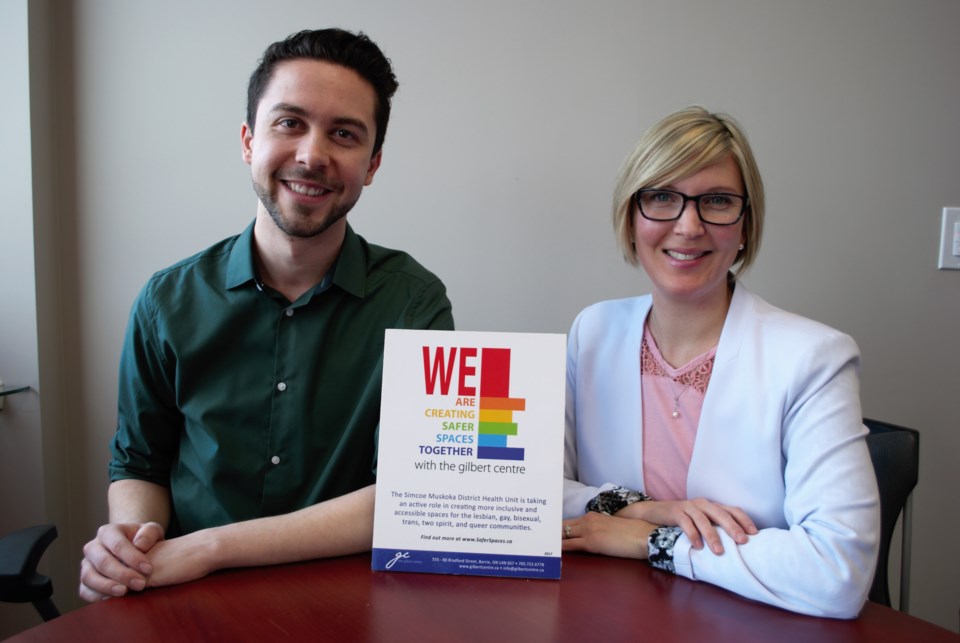Sometimes questions arise on how to interact with the LGBTQ community in a respectful way.
What pronouns should I use?
How can I be respectful when dealing with someone who’s transgender?
Is it disrespectful to ask questions at all?
If you’ve ever come across these questions in your line of work, the Gilbert Centre might be able to help with its Safer Spaces training program.
“They might not always be easy questions to answer,” said Dale Boyle, Safer Spaces program manager with the Gilbert Centre.
The Safer Spaces program started in April 2015.
“It started from taking a look at some research that was out in our community, primarily starting from a youth report called Making it Better Today. The report looked at some LGBTQ youth experiences in our community,” said Boyle. “A few of the things they were talking about (concerned) how to access service providers, but they weren’t because they were concerned about how they’d be treated.”
Later, the Gilbert Centre did a survey within local community organizations to get their thoughts on the issue.
What they found surprised them.
“A lot of organizations said they wanted to be welcoming, but had done very little to make their space welcoming,” said Boyle.
The Safer Spaces training program offers training for non-profit or for-profit organizations and businesses to look at business practices to ensure they are as inclusive as possible toward LGBTQ people in the Simcoe-Muskoka area.
The training is customizable to the needs of any organization. It can include an organization assessment tool, professional development training workshops or consultation services. Some of the topics that are explored in the training include using gender-neutral language, pronouns, sexual identity, local statistics and LGBTQ history.
“We’ve had organizations that have come to us with more questions (after the training) and we’ve sat down with them to look at their policies, procedures, washrooms, intake forms, etc.,” said Boyle. “Sometimes it can result in an organizational shift for inclusion.”
About 55 different organizations across the county have taken part in the training, including the Simcoe Muskoka District Health Unit, the Barrie Police Service, Hospice Simcoe and Georgian College.
Boyle estimates that about 200 workshops have been given and 4,000 people have been trained.
“Usually we get requests to do the training because either something has happened, or they want to prevent something from happening,” he said.
Sarah Gill, health promotion specialist with the health unit started collaborating with the Gilbert Centre five years ago on ways to train their staff. Last year, they handed the training completely over to the centre for the first time.
The Gilbert Centre also collaborated on developing policy for the organization.
“(The Gilbert Centre) is a wonderful outside partner to bring in to help lend credibility and resourcing to our staff,” said Gill. “The calibre of the program is such that we really feel it stands alone. (Initially) we were trying to work collaboratively because we were trying to tailor to a public-health environment. After working closely (with the Gilbert Centre) for so many years, we have such trust in the program and the delivery of it.”
One aspect of the training that stands out for Gill is the acknowledgement of professional humility.
“You don’t have to be an expert. You don’t have to know all the terminology,” she said. “The inclusive practice is having that humility as a professional to be able to say you’re open and inclusive and make people feel comfortable so they are able to disclose information and possibly teach us and work together to provide the best care.”
Gill said that based on the health unit’s experiences, they would definitely recommend the training to any non-profits or businesses who want to make their spaces more inclusive.
“I think it’s important because when you look at... the LGBTQ community, you’re not necessarily seeing how the person identifies because of how they look or dress. Those things can be invisible to you in an interaction,” she said. “So your actions and not understanding the ways you are using language... you may not know how that’s impacting them because it’s not visible. They will just never come back into your office or environment.”
“There’s so many things (we can do) to create inclusivity for the LGBTQ community that even go beyond the training. Having trained and competent staff is a must, and for people to start there, is great,” said Gill.
While the training up until now has mostly been with non-profit organizations, Boyle said the Gilbert Centre has been approached by local businesses as well and would welcome the opportunity to provide the training to any for-profit or non-profit entity that wants to make sure they are inclusive to LGBTQ people, clarifying that there is a cost for the training that can vary depending on options.
“The Gilbert Centre is a not-for-profit, charitable organization, and this is a revenue-generating opportunity for us to support our (other) programs,” said Boyle.
If you are a member of an organization or business who is interested in hosting the Safer Spaces training, contact Dale Boyle at the Gilbert Centre at 705-722-6778 ext. 105.



